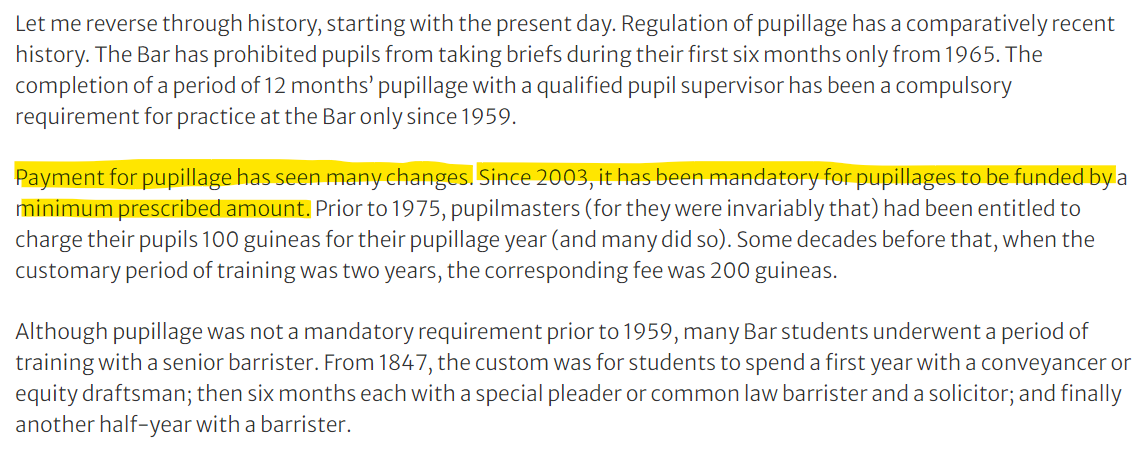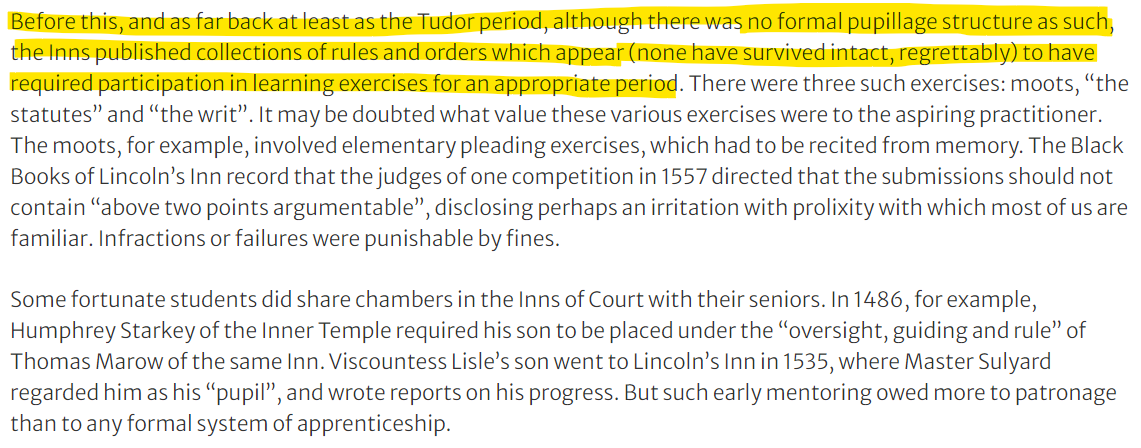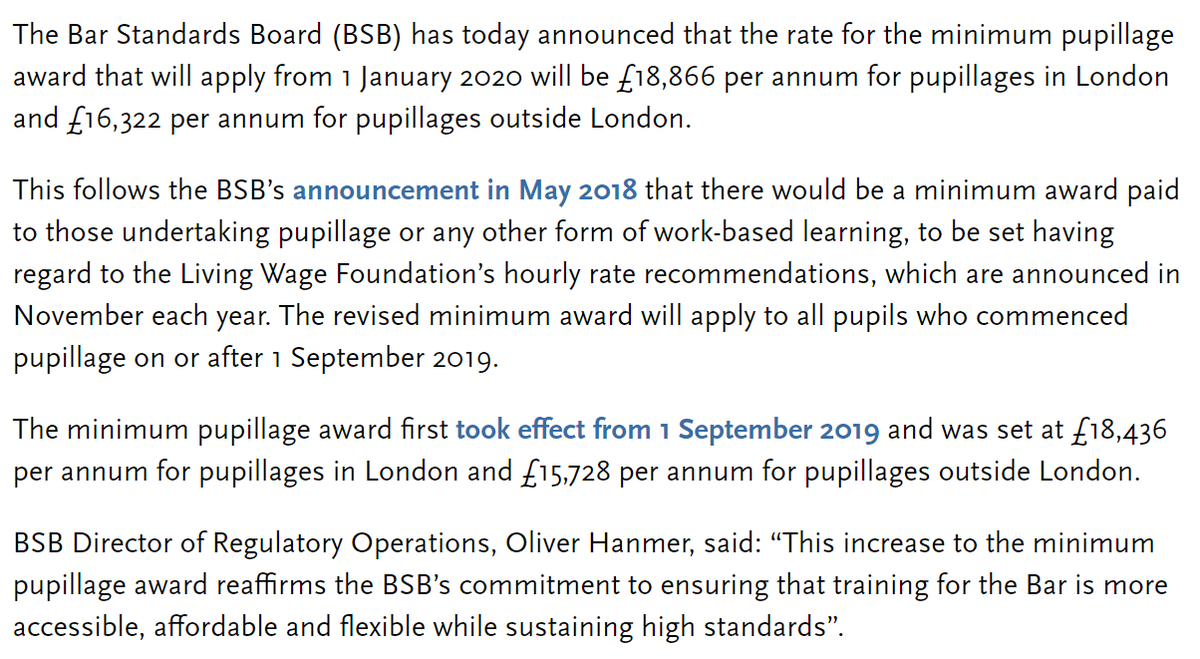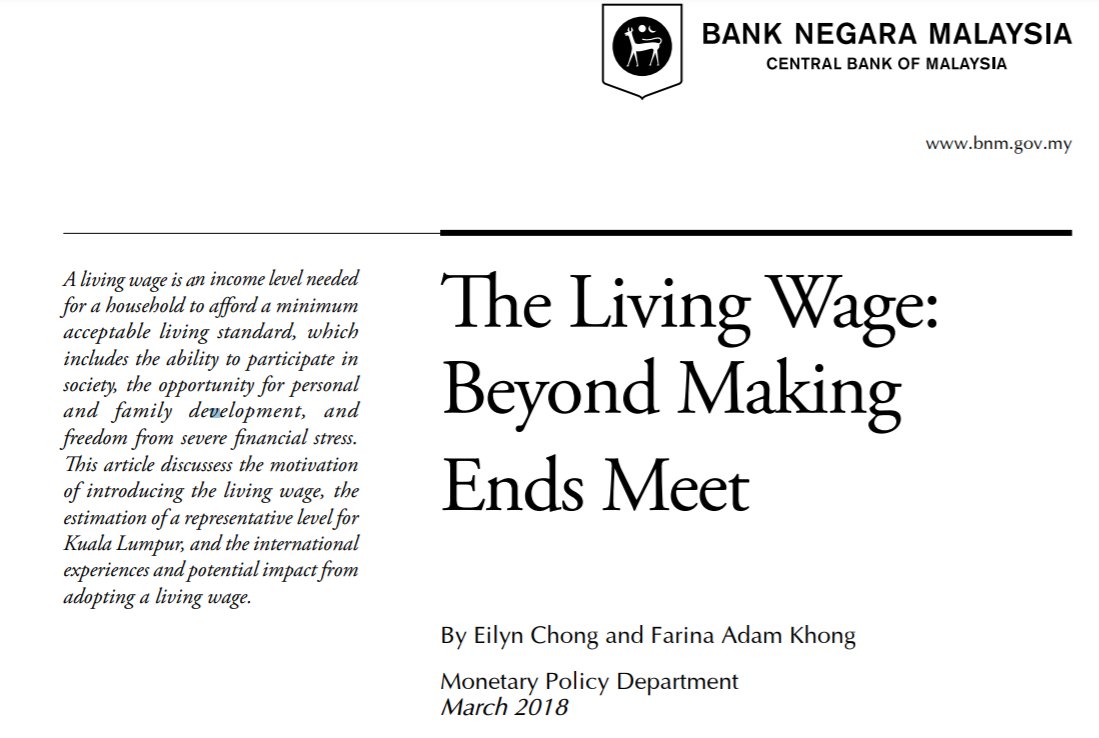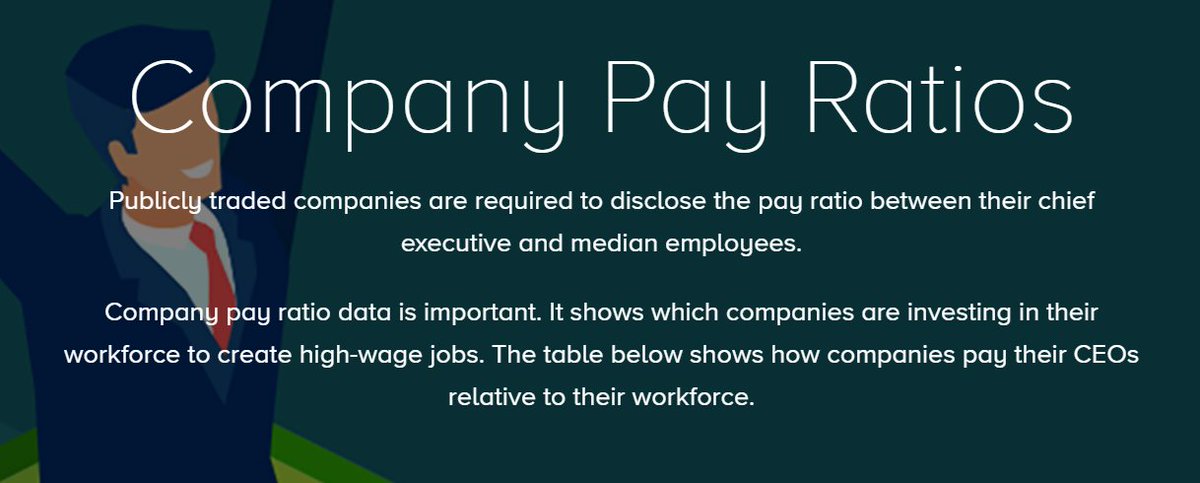My answers to common arguments/myths typically perpetuated on the topic of the economic exploitation of pupils (PICs) and young lawyers (LAs) at the Malaysian Bar. #Malaysia #Law
A thread https://abs.twimg.com/emoji/v2/... draggable="false" alt="🧵" title="Thread" aria-label="Emoji: Thread">
https://abs.twimg.com/emoji/v2/... draggable="false" alt="🧵" title="Thread" aria-label="Emoji: Thread">
A thread
Inb4 the usual caveats get brought up - yes, some PICs and LAs are lousy; yes, not all masters/ senior lawyers/ proprietors/ partners are bad; yes, the economy is not doing great right now.
And yes, am well aware that some practitioners are also judicious about only taking on pupils only when they need/want to train an LA for their practice, and not just for cheap labour. Hats off to them, sinecerely.
The fundamental answers remain the same, notwithstanding.
The fundamental answers remain the same, notwithstanding.
A) "Pupillage is a privilege, not a right/entitlement. PICs can& #39;t be demanding high pay. Hell, PICs should be paying to be taught by their masters."
1a) Ideals aside, the fact is that pupillage is a mandatory entry requirement to the profession. It& #39;s not a right, but...
1a) Ideals aside, the fact is that pupillage is a mandatory entry requirement to the profession. It& #39;s not a right, but...
2a) it IS a working-learning experience, which so many other professional/vocational industries also have (and pay for).
Take apprenticeships in the UK, where ppl combine work and study (and get paid for it).
https://www.prospects.ac.uk/jobs-and-work-experience/apprenticeships/what-is-an-apprenticeship">https://www.prospects.ac.uk/jobs-and-...
Take apprenticeships in the UK, where ppl combine work and study (and get paid for it).
https://www.prospects.ac.uk/jobs-and-work-experience/apprenticeships/what-is-an-apprenticeship">https://www.prospects.ac.uk/jobs-and-...
3a) Or take other industries that have significant on-the-job learning in the early years (medical housemanships). Or the plenty of graduate or management training programs in corporate jobs.
All of these train ppl for things they could not have picked up in the classroom.
All of these train ppl for things they could not have picked up in the classroom.
4a) So to those who say PICs shouldn& #39;t be paid - should the & #39;noble profession& #39; not seek to outdo or at least match all of these other professions, some of which are not so & #39;noble& #39;?
5a) Pupillage has never been this immutable concept. Have a look at this brief history of pupillage in England & Wales, which is instructive and echoes a lot of themes familiar to us:
https://www.counselmagazine.co.uk/articles/pupillage-potted-history">https://www.counselmagazine.co.uk/articles/...
https://www.counselmagazine.co.uk/articles/pupillage-potted-history">https://www.counselmagazine.co.uk/articles/...
B) "But when I was a PIC back in the 60s/70s/80s/90s I managed to survive on a RM300/400/500 allowance, and I turned out fine. PICs/LAs are so demanding nowadays."
1b) See above. And...
1b) See above. And...
2b) Because of inflation and much higher cost of living, it should be clear to anyone why this is problematic.
DOSM& #39;s CPI inflation calc says RM500 in Jan 1980 is worth RM1,433.40 in Jan 2020: https://www.dosm.gov.my/cpi_calc/
So">https://www.dosm.gov.my/cpi_calc/... even accounting for inflation, this is much too low.
DOSM& #39;s CPI inflation calc says RM500 in Jan 1980 is worth RM1,433.40 in Jan 2020: https://www.dosm.gov.my/cpi_calc/
So">https://www.dosm.gov.my/cpi_calc/... even accounting for inflation, this is much too low.
3b) Financial barriers to entry also exclude competent but economically disadvantaged candidates from the talent pool - hurting our diversity and quality.
I.e. those who don& #39;t live w parents or whose parents can& #39;t subsidise them are less able to afford to do pupillage.
I.e. those who don& #39;t live w parents or whose parents can& #39;t subsidise them are less able to afford to do pupillage.
4b) Curious how these lawyers usually never mention that the Bar at England & Wales, from which we& #39;ve derived so many of the so-called traditions we love expounding, has a mandatory minimum allowance for pupils: https://www.barstandardsboard.org.uk/resources/minimum-pupillage-award-from-1-january-2020-announced.html
...">https://www.barstandardsboard.org.uk/resources...
...">https://www.barstandardsboard.org.uk/resources...
C) "So then, how much pay is good enough? What& #39;s a good level of pay?"
1c) For starters, see above. London PICs will get £18,866 pa; PICs outside London, £16,322 pa. This is pegged to the Living Wage standard (not to be confused with the minimum wage, which is a statutory std).
1c) For starters, see above. London PICs will get £18,866 pa; PICs outside London, £16,322 pa. This is pegged to the Living Wage standard (not to be confused with the minimum wage, which is a statutory std).
2c) We can look to do the same here. What& #39;s a "living wage"? See this 2018 Bank Negara paper. They pegged it at around RM2.7k/month for a single adult, RM4.5k/month for a couple w/o child and RM6.5k for a couple with 2 kids (all in Kuala Lumpur).
https://www.bnm.gov.my/index.php?ch=en_publication&pg=en_work_papers&ac=62&bb=file">https://www.bnm.gov.my/index.php...
https://www.bnm.gov.my/index.php?ch=en_publication&pg=en_work_papers&ac=62&bb=file">https://www.bnm.gov.my/index.php...
3c) It& #39;s not a perfect measure by any means and every individual& #39;s situation is different, but it& #39;s a good start. And it clearly tells you that the current RM1.2k national minimum wage (the statutory standard) is woefully inadequate. https://www.thestar.com.my/news/nation/2019/10/28/economist-rm1200-minimum-wage-still-below-living-wage-in-klang-valley">https://www.thestar.com.my/news/nati...
D) "Well, law is a noble profession. If you& #39;re coming into it for high pay, it& #39;s not the right place for you. "
1d) See above
2d) I wish we could eat nobility
3d) If money isn& #39;t your motivation, why so touchy bout giving PICs/LAs more?
4d) It& #39;s about fair compensation for labour
1d) See above
2d) I wish we could eat nobility
3d) If money isn& #39;t your motivation, why so touchy bout giving PICs/LAs more?
4d) It& #39;s about fair compensation for labour
5d) Human rights (which so many at the Bar claim the profession must champion) includes economic rights. People should be compensated fairly for their labour. Anything less is economic exploitation.
Yes, sometimes, their labour sucks. If so, fire them.
Yes, sometimes, their labour sucks. If so, fire them.
E) "Anyway, the legal education system does not prepare graduates for practice. PICs aren& #39;t worth the money/need too much training."
1e) See above.
2e) Since we have decided this is how ppl enter the industry, it& #39;s unfair to pass the buck for the system& #39;s failings on to PICs.
1e) See above.
2e) Since we have decided this is how ppl enter the industry, it& #39;s unfair to pass the buck for the system& #39;s failings on to PICs.
3e) We know the Common Bar Course is unlikely to become a reality any time soon. But it doesn& #39;t change the fact that a fair wage is an economic right.
F) "Before asking for high pay, PICs and LAs must prove themselves first. Prove you can bring in business or bill enough to justify higher pay."
1f) See above. Human rights.
2f) Also, this contradicts D) above. Am aware they& #39;re not usually made by the same ppl, but worth noting
1f) See above. Human rights.
2f) Also, this contradicts D) above. Am aware they& #39;re not usually made by the same ppl, but worth noting
3f) This argument ignores the context in which equity/capital is divided in a law firm.
Essentially, the employer-employee bargain is that the employer takes the profits, but also the risk of hard times and low/no profits. They also have to *get* business.
Essentially, the employer-employee bargain is that the employer takes the profits, but also the risk of hard times and low/no profits. They also have to *get* business.
4f) The employee gets paid much less, but gets paid steadily and doesn& #39;t generally have to shoulder risk.
So the employer stands to make a killing, while the employee has security. In theory.
And what you pay for (even pay highly for) is quality work. Not billables per se.
So the employer stands to make a killing, while the employee has security. In theory.
And what you pay for (even pay highly for) is quality work. Not billables per se.
5f) Ofc, you can blur this distinction (and arguably many firms do this to some extent). Offering commissions or bonuses for bringing in business or hitting billable targets.
But you have to ask what you& #39;re paying for vs what you& #39;re asking for out of LAs. Meaning...
But you have to ask what you& #39;re paying for vs what you& #39;re asking for out of LAs. Meaning...
If you& #39;re asking LAs to take on more & #39;employer& #39; work (drumming up business), or even if you& #39;re asking them to take a pay cut because of tough times, are you also proposing to compensate them more like an employer & give them a better cut during the good times?
You shouldn& #39;t be asking that LAs be partner material first before you even want to pay them better, for quality work. You can& #39;t conflate the two.
Pay them well first, for quality work. And offer them more if they& #39;re willing to be more invested in the practice as a business.
Pay them well first, for quality work. And offer them more if they& #39;re willing to be more invested in the practice as a business.
G) "There are business realities. Competition is driving legal fees/billables down and firms have to keep costs low to stay competitive. It& #39;s simple supply and demand."
1g) See above. Human rights, employer-employee bargain.
1g) See above. Human rights, employer-employee bargain.
2g) Counterfactual: while we hear a lot about everyone including staff, juniors, LAs taking cuts when times are tough to help the firm, we never really seem to hear about salary raises or extra bonuses in good times.
So employees are asked to take risks but not rewards.
So employees are asked to take risks but not rewards.
H) "Besides, nobody is forcing any PICs/LAs to take low pay. They should negotiate the pay they want, and if they don& #39;t like it they can leave. Lawyers are not laypersons, they do not let themselves get exploited."
1h) This completely ignores economic realities. Essentially...
1h) This completely ignores economic realities. Essentially...
... PICs/LAs simply do not have economic leverage and bargaining power, esp at this time where there& #39;s no shortage of law grads.
Some lawyers seem to think bargaining is merely a function of lawyerly skill but it is disingenuous at worst, shortsighted at best. Because...
Some lawyers seem to think bargaining is merely a function of lawyerly skill but it is disingenuous at worst, shortsighted at best. Because...
... there& #39;s a difference in negotiating for your client (and even then, surely you have had situations where you& #39;re negotiating with a bad hand because your client has no leverage) and negotiating for yourself, with your employer/potential employer, who has power over you.
2h) There& #39;s still a cultural stigma against talking money. Difficult to ask for a raise when there are so many landmines to navigate. You risk pissing off/rubbing off your boss the wrong way, being seen as money-hungry. Even more so if they are abusive or bad-attitude bosses.
3h) How many times have we seen discussions where senior lawyers/proprietors mock those who expect higher pay, and call them demanding? See B).
In these anecdotes we don& #39;t know the full story, we don& #39;t know how much they were asking for or if they were deserving or not ...
In these anecdotes we don& #39;t know the full story, we don& #39;t know how much they were asking for or if they were deserving or not ...
... which surely has a chilling effect on LAs, who see these discussions and think: better to not rock the boat. Better to grind quietly, be & #39;humble& #39; (i.e. deferential) and hope to be elevated later on. Or climb the ladder steadily at a larger firm.
4h) External economic pressures mean the choice of employers and pay is more illusory than people think.
E.g. i) You& #39;ve got loans/mortgages to pay, families to support, you& #39;ve been job-hunting for 2 mths now. Can you afford to reject a lowball offer and hold out for higher pay?
E.g. i) You& #39;ve got loans/mortgages to pay, families to support, you& #39;ve been job-hunting for 2 mths now. Can you afford to reject a lowball offer and hold out for higher pay?
ii) You& #39;ve sat CLP twice, earning only a little side income as a paralegal for 2 years. Now COVID has hit and places aren& #39;t hiring. Are you still going to hunt for the perfect master/good pay, or would you rather try and get your pupillage done ASAP so you can earn more as an LA?
5h) All the above are situations where yes, technically a particularly determined PIC/LA can get the position and pay they want - if they& #39;re willing to endure a lot. But it& #39;s not their fault that they can& #39;t or aren& #39;t in a good position to do so. https://newrepublic.com/article/141663/united-states-work">https://newrepublic.com/article/1...
It& #39;s not entirely dissimilar to blaming all poor people for not being able to lift themselves out of poverty (& #39;they just have to try hard enough!& #39;), ignoring that they face significant disadvantages and hurdles. https://www.investopedia.com/terms/p/poverty-trap.asp">https://www.investopedia.com/terms/p/p...
Lastly I just wanted to say that I think I& #39;m actually being paid quite well and have been happy where I am. And also that I feel secure enough to raises these issues about PICs, LAs and exploitation without being overly fearful.
That is privilege. But it shouldn& #39;t be.
That is privilege. But it shouldn& #39;t be.
There& #39;s one last thing I forgot to add.
I) "Once you run your own practice, you& #39;ll understand. There are overheads and other costs and business is difficult. It& #39;s not easy to offer PICs/LAs high pay."
1i) Forget about the obfuscating talk of overheads. The real tension is:
I) "Once you run your own practice, you& #39;ll understand. There are overheads and other costs and business is difficult. It& #39;s not easy to offer PICs/LAs high pay."
1i) Forget about the obfuscating talk of overheads. The real tension is:
... Every additional ringgit paid to a PIC/LA is one ringgit less that can go into the pockets of the equity-owning lawyers. On an accounting level, at least, this is zero-sum.
2i) The question we should be asking is: when lawyers say they can& #39;t afford to pay their PICs/LAs more, they are necessarily implying they don& #39;t want to take home less money. We can& #39;t know for sure how justified this is, because of course that is not info they will give us.
3i) Does that mean equity-owning lawyers should publicly disclose their earnings? That& #39;s a different can of worms. But I wish they would at least be more honest or reflexive about their own pecuniary interest in all of this.
4i) Of course, this doesn& #39;t have to be zero sum at all. If you believe that paying better attracts better talent, improves your capacity to take on work and your output quality, then that higher pay is an investment yielding positive returns - not an overhead cost.
5i) In fact, that& #39;s where the concept of company pay ratios may be useful. Such pay ratios measure the diff btwn what execs and median employees are paid, and are a measure of investment in workers + inequality in a company.
https://aflcio.org/paywatch/company-pay-ratios">https://aflcio.org/paywatch/...
https://aflcio.org/paywatch/company-pay-ratios">https://aflcio.org/paywatch/...
6i) So if an acceptable pay ratio can be agreed on, you at least have a benchmark for what you can really afford to pay your PICs/LAs, and you have an accountable mechanism to track how your pay cuts should be distributed in tough times.

 Read on Twitter
Read on Twitter